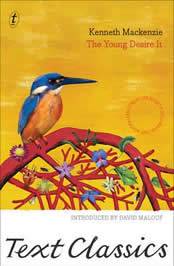Reviews
awards | publications | book reviews
The Young Desire It by Kenneth Mackenzie

The young desire it. Sex, that is. This is a story of sexual awakening, the ‘unquenchable thirst’ and ‘first springing desire’ of the young, and of another desire − that of adults to thwart them. It is also a story told with psychological truth in achingly beautiful prose.
Life isn’t easy in the 1920s for young Charles Fox who has been sent to a prestigious Anglican boarding school. At fourteen he is innocent in a way few adolescents today are. Having spent his childhood with his widowed mother on an isolated farm with only his dreamy imagination to sustain him, he receives a sickening shock on his first day at school when sexually assaulted by a group of older students. Worse is to follow when he attracts the attention of the languages master, Mr Penworth, a disaffected Englishman with a penchant for beautiful boys.
At first Charles doesn’t realise the reason for Penworth’s interest in him and finds in his company an antidote to the mindless roughness of the playground. But innocent though he is, he does know that men aren’t supposed to kiss each other.
The jibes and physical attacks of his class-mates force him to develop a carapace of defiance and isolation. Even to a fellow sufferer he cannot acknowledge what is happening to him:
‘To have done that would have been to admit his own dislike and fear, which he intended never to do.’
At last comes the Easter break and the brief return home where he meets a young girl called Margaret. The attraction between them is instant, experienced by both in the wordless way of the very young. How their relationship develops is the ‘plot’, woven into the wider concerns of a coming-of-age story.
Charles is discovering his sexuality in a bad place − a boarding school hedged about with exploitative sexual practices and the malice of unthinking boys. His growing understanding, his interest in intellectual ideas and blind groping towards what it means to be male are all explored by Mackenzie. Indeed, what constitutes ‘manhood’ can fairly be said to be the sub-theme of the novel.
The Young Desire It is autobiographically based. The detached voice of the narrator comments on the behaviour of his younger self who views his experience with ‘youth’s impatient, humourless eye.’ In the older man’s descriptions of that experience we feel the boy’s pain, a pain contained within prose of redemptive clarity.
In his desire for the girl he has met in the open fields during a sudden storm, Charles discovers that, contrary to the old adage, all the world does not love a lover. Though she clothes her motives in double-speak, his kindly but distant mother is antagonistic to his interest in Margaret. Driven by his own sexual feelings for Charles, Mr Penworth is equally negative. In the face of this opposition from the two important adults in his life, a spirit of defiance is aroused in the boy.
The changing seasons reflect his sexual awakening. In spring Charles finds the roses in his mother’s garden ‘hot as the faces of amorous girls.’ Returning in the stunned pause of summer, the changed season is linked to the changed boy. His heightened sensual delight in the summer landscape mirrors his unspoken desire for Margaret. Under the great hot sky she places her hand over his eyes.
‘If he opened them he saw a dim colour of flesh, with light coming sharply under the edges; it felt warm and alive, as though her naked body were against his face.’
Mackenzie’s simple spacious language penetrates deeper truths, as in Charles’ reflections on the nature of death following the suicide of the headmaster. For the fatherless boy the headmaster had represented a ‘positive masculinity’ which Penworth lacks. Charles is seeking a father figure and finds it in the old man, as well as in his house-master, Mr Jolly − a wonderful portrait by the way.
What a pleasure this book is. Readers will find in its pages an evocation of that strange half-world between childhood and adulthood which we all once inhabited. I can think of only one other novel that is comparable and as nearly good: Antonia White’s equally classic Frost In May which fictionalises her own experiences in a Catholic girls’ boarding school.
I cannot remember a book I have loved so much in the last twenty years of reading. Mackenzie’s classic sentence structure, eighteenth-century in its precision, rarely falls into excess. What especially enchants is the almost hymnal quality of the slow-rolling rhythms:
‘The days were lengthening, mysterious now with spring’s virginity and promise; the cold nights were shorter, brilliant in moonlight green or the dark silver of starlight, cloudless, windless, frosty and serenely still.’
The Young Desire It was written white hot in six weeks by the author when in his early twenties, under the impulse of intensely remembered experience. It is our good fortune that it has been rescued from oblivion and re-printed by Text Publishing, that champion of the best of Australian literature. I am wary of praising too highly for fear of setting up expectations that might prevent other readers from discovering their own delights. All I can say is, this is a book you won’t regret reading.

